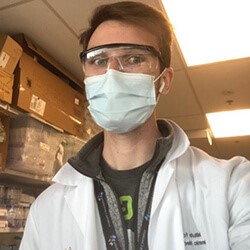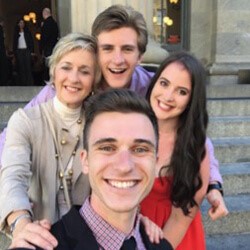White Coat Profile: Dominic Julian
Meet Dominic Julian
A diagnosis of post-concussion syndrome after his younger sister’s high school sports injury is what initially sparked Dominic Julian’s career interest in neuroscience.

Originally from Columbus, Ohio, Dominic started out as a biochemistry pre-medicine undergraduate major in 2012. He changed his major to the new field of neuroscience at Ohio State University.
“The more I sank my teeth into my undergraduate coursework in neuroscience, the more I fell in love with it and realized this is my passion,” said Julian. “There's so much still left to uncover, and I love learning about this three-pound chunk of tissue inside our heads. It holds who we are, what we do, and how we experience life and interact with the world around us; learning more about the brain can mean big things for our health in terms of aging and longevity, and for the development of children. There are so many different avenues to neuroscience.”
Both during and after his undergraduate program, he worked in several labs, including Nationwide Children’s Hospital in Columbus, Ohio. This helped him develop a strong research background studying the impact of rare genetic mutations in neurodevelopment and how they can lead to dysfunction in the brain — along with other conditions like Alzheimer’s, autism spectrum disorders and epilepsy. Julian notes that he initially wanted to pursue a doctorate in neuroscience research; however, the more he worked in the lab, the more he realized something else about himself.
“I was missing something by just doing research and working in the lab for hours on end. Yes, I enjoyed translating findings into academic research papers and then communicating the science out to the rest of the world. But research alone wasn't what I was passionate about. I was missing the human element of translational medicine; I wanted to be a part of the team directly taking care of the people who were suffering from the conditions I was studying in the lab,” said Julian.
“The physician scientists at Ohio State and Nationwide Children’s who I worked with after undergrad were running their own research labs, and then taking their results from the bench to the clinic. Their results were helping patients and moving health care forward. I wanted to pursue this pathway because I saw an opportunity to blend my skills in the research lab with this profession of helping others. I want to be that person for somebody in the wake of a difficult diagnosis, or in the place where they need somebody to help them most,” said Julian.

“Seeing my grandpa pass from such a horrible disease and witnessing the lasting impact it left on my family was heart-wrenching. Ultimately, the pain of losing him and the treacherous nature of the disease made me that much more dedicated to fighting to save my future patients’ lives as both a doctor and a researcher,” said Julian.
Julian was accepted to the MD/PhD Program at the University of Arizona College of Medicine – Phoenix. The program is designed to train students planning careers in academic medicine or biomedical research. He will join his classmates as they participate in the Class of 2025 White Coat Ceremony.
“My grandpa was always one of my biggest supporters, and my family has always been so supportive of me chasing whatever dreams I want to pursue,” said Julian. “I know I am going to be thinking of him the moment that white coat gets put on me,” said Julian. “I am also going to be thinking of all of the people I love — my family, my mentors and the people I lost in my life who can't physically be there with me,” said Julian about the important milestone.
“The white coat and responsibility that comes with becoming a physician is a privilege that I am honored to be entrusted with. When I sit down with my future patients and their families, I hope they feel like they have a true friend and partner in whatever battle or struggle they are facing.”
About the College
Founded in 2007, the University of Arizona College of Medicine – Phoenix inspires and trains exemplary physicians, scientists and leaders to advance its core missions in education, research, clinical care and service to communities across Arizona. The college’s strength lies in our collaborations and partnerships with clinical affiliates, community organizations and industry sponsors. With our primary affiliate, Banner Health, we are recognized as the premier academic medical center in Phoenix. As an anchor institution of the Phoenix Bioscience Core, the college is home to signature research programs in neurosciences, cardiopulmonary diseases, immunology, informatics and metabolism. These focus areas uniquely position us to drive biomedical research and bolster economic development in the region.
As an urban institution with strong roots in rural and tribal health, the college has graduated more than 1,000 physicians and matriculates 130 students each year. Greater than 60% of matriculating students are from Arizona and many continue training at our GME sponsored residency programs, ultimately pursuing local academic and community-based opportunities. While our traditional four-year program continues to thrive, we will launch our recently approved accelerated three-year medical student curriculum with exclusive focus on primary care. This program is designed to further enhance workforce retention needs across Arizona.
The college has embarked on our strategic plan for 2025 to 2030. Learn more.